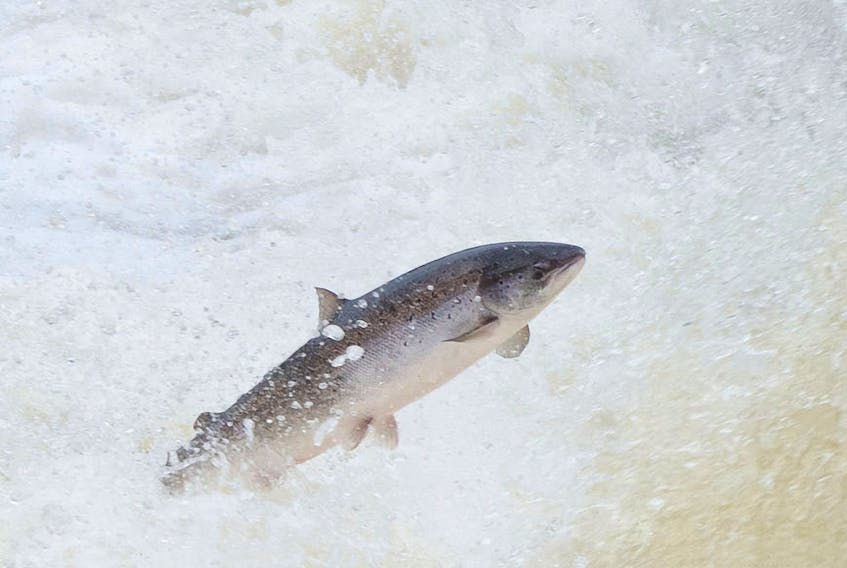There is no doubt that wild Atlantic salmon stocks are decreasing worldwide. This has been the case for 50 years.
I am deeply concerned with decline in Atlantic salmon. I am a conservationist, a biologist, aquaculturalist, an angler and a Newfoundlander and Labradorian who cares about the future of our salmon stocks. I have been involved in salmon enhancement of North Arm River for almost three decades, as a member of the Green Team Conservation Corps of Newfoundland and Labrador, as a river guardian, Deputy Mayor of Holyrood, North Arm River Restoration Committee member and concerned citizen.
All too often environmental groups, special interest groups and ideologists point the finger at aquaculture as the cause of salmon decline.
The decline in Atlantic salmon stocks worldwide has been well documented long before the existence of aquaculture operations. Atlantic salmon stocks continue to decrease in areas where there is no aquaculture nor has there ever been. In 2017, salmon returns for the Exploits River had decreased by nearly 50 per cent from the previous year, 2016. This river is, in either direction, more than 4,500 km along the coast from the nearest salmon farm marine site.
All too often these special interest groups mask themselves as environmentalists, scientists and conservationists when in fact they are associations of anglers that “catch and kill” or “catch and release” salmon for sport. So be it.
I am an angler, also. The difference is I announce myself as such. Likewise, I always announce myself as someone who supports and works in the aquaculture industry also.
These special interest groups tend to focus on aquaculture as a cause of decline although this has not been proven scientifically in this province. In a recent Telegram editorial: “Angling for a Solution” the editor admits that there are many unknowns regarding the declining Atlantic salmon stock. In this editorial he briefly alludes to predation and changes in oceanographic conditions then shifts quickly to elaborate extensively on aquaculture.
What the editor neglects to mention are other factors that we know for certain contribute to the decline of our beloved Atlantic salmon.
Each year anglers from around the world and here at home capture and retain tens of thousands of salmon that enter our provincial rivers and streams to produce the next generation of salmon.
According to DFO in 2016 approximately 31,191 adult salmon were caught and killed in this province totaling more than 55 tonnes.
As an angler I am personally not a fan of catch and release as it creates unnecessary harm to fish that are already stressed having re-entered fresh water from the sea to spawn, many times in less than favourable water conditions.
According to DFO approximately 37,302 salmon are reported to have been caught and released in 2016, a 26 per cent increase over previous years. Assuming there is 10 per cent mortality from catch-and-release practices (Dempson et al. 2002), then this would result in a loss of approximately 3,700 additional spawning salmon annually or approximately 7 tonnes.
West Greenland has no native salmon population but, in 2015 through intercepting stocks from Atlantic Canada, harvested 58 tonnes.
Labrador has an annual subsistence fishery that harvested 13,252 salmon or approximately 39 tonnes in 2016.
According to North Atlantic Salmon Conservation Organization (NASCO), the salmon fishery at St-Pierre-Miquelon, although small at five tonnes, has been shown to exploit North American stocks, some of which are critically endangered including those on the South coast of Newfoundland.
DFO estimates that there are an additional estimated 25 tonnes of unreported catch.
Other contributing factors to the decline of Atlantic salmon include bycatch of adult salmon and salmon parr in recreational and commercial fisheries.
We cannot ignore pollution of our estuaries, rivers and bays as a result of sewage disposal and other human and industrial waste.
As reported in the Telegram last September, at least one community has been dumping untreated sewage into the Exploits for decades, even as late as last fall.
In our province there are many man-made barriers such as hydroelectric dams located near Conne River, woods roads and improperly place culverts. According to The Telegram, on Sat., May 27 of last year an incident occurred which resulted in the loss of approximately 60 kelt and 840 smolt at the Bishop Falls power plant.
Of course, as the editorial alluded to, we have to consider climate change and of course decreases in marine survivability as a result of increased predation.
More than 10 million hungry seals off our coast and in our rivers is most likely a significant contributing factor also.
And let’s not forget poaching.
DFO says fishery officers and fishery guardians recorded 141 violations in 2017 including 99 inland incidents and 11 coastal violations. 26 illegal nets were found and removed.
But let’s be honest, the majority of poachers in this province do not get caught.
As a conservationist, supporter of aquaculture and an angler I suggest we need to focus more attention on reducing the impacts of what we do know negatively effects the decline of Atlantic salmon by more than 200 tonnes annually while at the same time continue to work collaboratively to research what we do not fully understand.
Mark Lane
Executive Director
NL Aquaculture Industry Association








